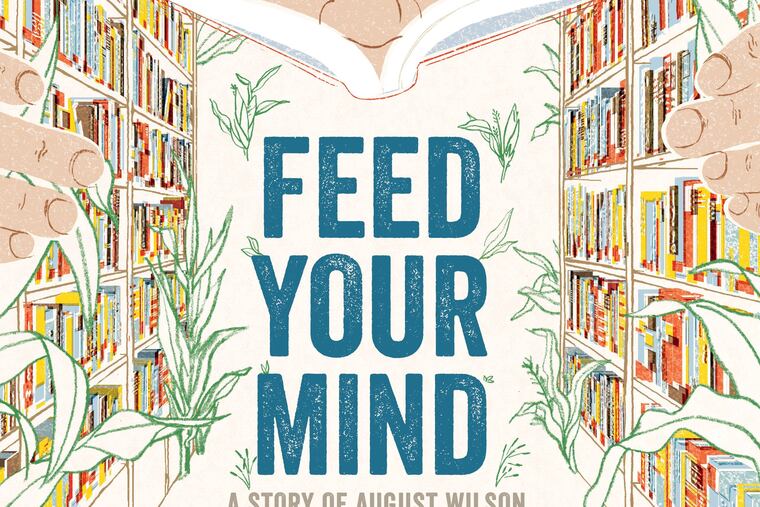Chester County author of new children’s book about August Wilson finds inspiration in her subjects
Jen Bryant has written 21 biographies for children. The latest is a picture-book bio of August Wilson, the Pittsburgh-born playwright.

Jen Bryant knows something about how a place can shape the lives of creative people.
For painter Georgia O’Keeffe, it was the desert and the huge dried bones she found there.
For poet William Carlos Williams, it was the Passaic River in New Jersey; for painter Horace Pippin, his peaceful home life in West Chester.
And for writer August Wilson, the two-time Pulitzer Prize-winning playwright and subject of Bryant’s latest children’s book, Feed Your Mind, it was Pittsburgh — and the library.
“It’s my own curiosity about the creative process, and how it manifests itself," Bryant said. "I am curious where did their creativity begin?”
For Bryant herself, it was the “trial of the century” in her own hometown of Flemington, N.J. — in which Richard Hauptmann was found guilty of kidnapping and murdering the 20-month-old son of Charles Lindbergh — that became the subject of her first novel, The Trial. She has since written 40 books, including 21 biographies for children.
The Inquirer talked with Bryant, who now lives in Chester County, about Feed Your Mind and what motivates her.
What was it about August Wilson that made you want to write this book?
I feel like the subjects of my books choose me. When I saw two of his plays at People’s Light and Theater, Seven Guitars and Fences, several minutes into the live performances, I was struck by the dialogue and by the use of really beautiful language. The characters were so fascinating. … As with all the other biographies, I’ve found that artists, whatever circumstances they find themselves in and whatever material immediately available to them, they mine that and make it into extraordinary art that is universal. All of his plays, except one, is set in the Hill District in Pittsburgh. But everyone, from Philadelphia to London to rural Texas, can relate to his plays.
Where did the title “Feed Your Mind” come from?
It was part of the title of a speech that August Wilson gave at the 100th anniversary of the Hill District branch of the Carnegie Public Library: "Feed your mind, the rest will follow.” The library invited him back to speak [in 1999] because he had gotten his first library card at that branch in 1950, when he was 5 years old, and from that time on, books and independent learning became a part of his life.
So much of your book focuses on Wilson’s love for reading as a child. Is there a hope this encourages children to read more?
As the author of biographies for young people, I try and allow the important things to arrive out of the story naturally and organically, and I try to stay out of the way. Readers, on their own, will come away with the reason these folks are great in their fields is because of the decisions they made, and the work they did. The risks they took. They see things differently from the rest of us. You have to take a chance to be excellent at anything.
Despite dropping out of high school, Wilson won the Pulitzer for “Fences” in 1987 and for “The Piano Lesson” in 1990. Did you find that inspiring?
Here’s a kid, who at age 15, drops out of school [because he is being bullied at an all-white high school]. But he goes to the library because his mother has told him to value education. His mom played a big part in his being a reader. She made sure he would have exposure to books. Her voice was in his head, because she told him, “If you can read, you can do anything.”
You have called your picture book bios, “portraits” of the artists you’re writing about. Why is that?
I feel like it’s almost like portrait painting. They have big lives and they know a lot of people. But I try to focus in on their own words and their own work, and try to bring some kind of emotional connection to kids. It’s more of a portrait than a mural. If 12 people are painting a portrait of you, you would get 12 different portraits, even though they are all looking at you. [The information] has to be filtered through what they find interesting. I have to find something that is fascinating to me and I pass that on.
“Feed Your Mind” is told in verse. Your first novel, about a 12-year-old girl watching the trial of the man accused of killing the Lindbergh baby, is told in verse. Is poetry your first love?
Yes, in fact, I started writing both picture book biographies and verse novels because I wanted to combine my love of poetry and lyrical writing with my love of research. Many of the poems I have written for adults are narrative, and focus on details that fascinated me about people or events from history.
Why is it important to you to write about accomplished people for children?
When I come across someone who creates something extraordinary: art, poetry, plays, music, etc., out of ordinary circumstances, I usually feel compelled to try and share that with kids. It’s because I think by sharing those stories, kids can see for themselves that creativity — in all of its various forms — is part of being human, and if you pay attention to your life, to what’s around you, if you focus and you practice, then amazing things can happen.